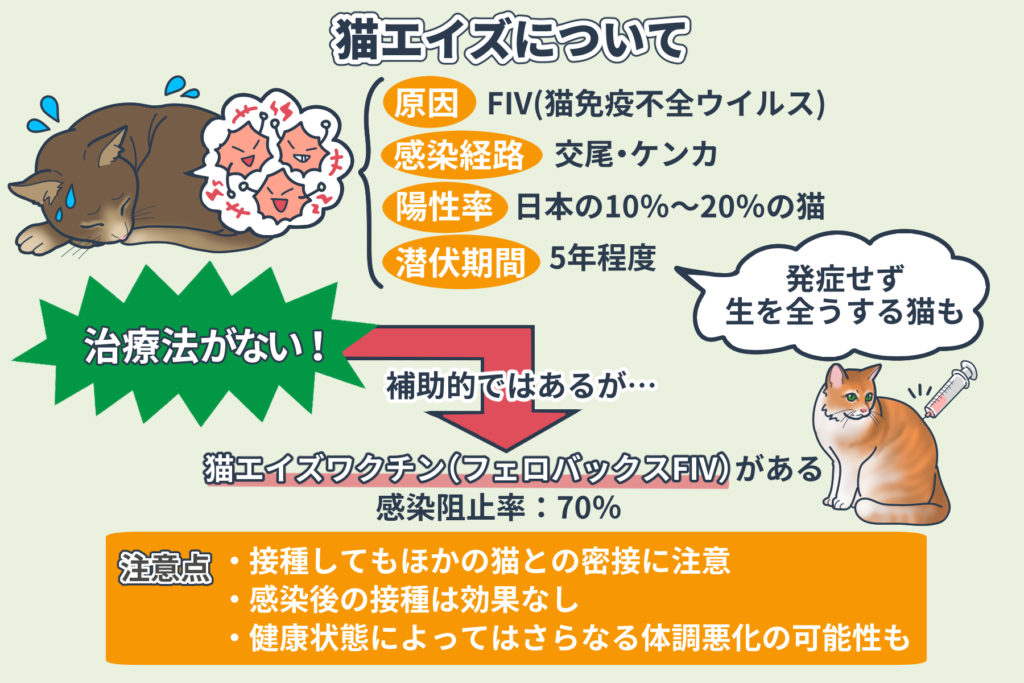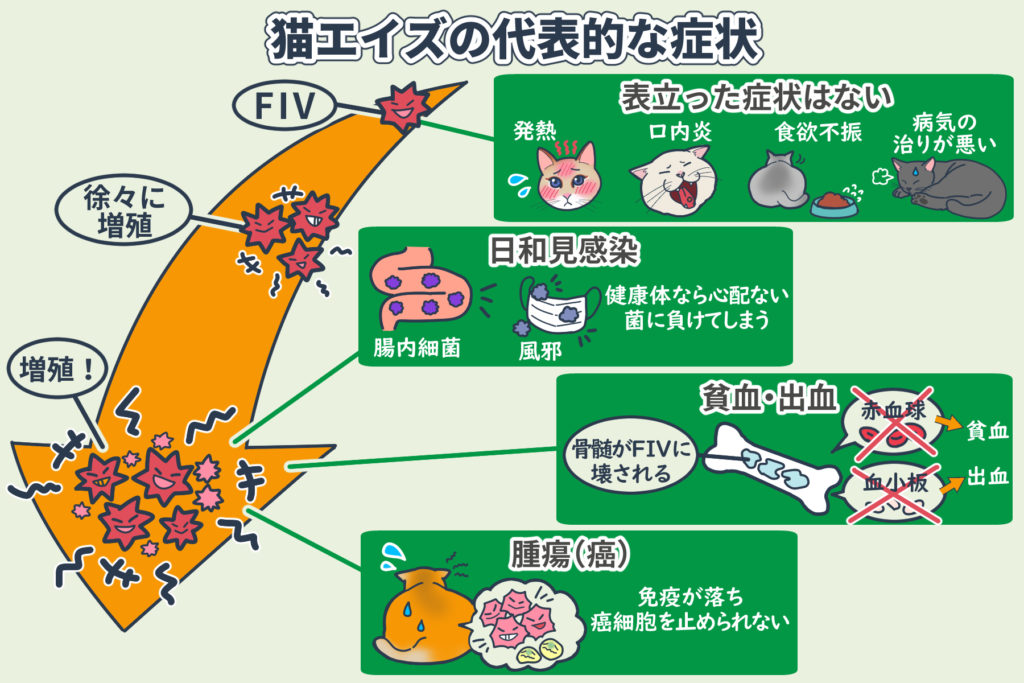- Feline AIDS, once it develops, has no cure and leads to immune deficiency, making it a challenging disease.
- The virus FIV, which causes feline AIDS, infects the immune cells of cats but does not show significant symptoms in the early stages.
- Through efforts to boost the immune system, it is possible to improve the cat’s condition, maintain its quality of life (QOL), and restore its appetite.
目次
What is Feline AIDS?

Cats can become infected through mating or fighting with FIV-positive cats.
It is estimated that 10% to 20% of cats in Japan are infected.
Because no fundamental cure has been found for this disease, once it develops, there is no cure, and it leads to immune deficiency, making it a difficult disease.
However, infection does not mean that severe symptoms will appear early on; there is a latent period of about five years (this can vary among individuals).
During this time, the cat can live normally, just like a healthy cat.
Because the latent period is long, some cats can live out their natural lives without developing symptoms.
Therefore, finding out that a cat is infected is not a reason to be overly pessimistic.
However, the long latent period means there is a possibility of unknowingly infecting other cats.
If it is confirmed that a cat is infected, it is an important courtesy to keep the cat indoors strictly.
Causes of Feline AIDS Infection
Cats can become infected with feline AIDS if they are bitten or mate with an infected cat, or if they are born to a mother cat infected with feline AIDS.
The FIV virus itself is very weak, so it does not spread through the air.
It is said that about 10% to 20% of cats are infected with feline AIDS, so outdoor cats that frequently interact, mate, or fight with other cats have a higher risk of contracting the virus.
※Feline Immunodeficiency Virus (FIV) and Human Immunodeficiency Virus (HIV) are different viruses. Rest assured, even if you are bitten by a cat infected with feline AIDS, you will not develop AIDS.
Effective Prevention of Feline AIDS
Once feline AIDS develops, there is no cure. However, by having your cat neutered or spayed while they are still young and not at risk of infection, you can reduce the risk of infection to almost 0%.
Neutered cats are less likely to engage in mating and fighting, significantly reducing the risk of infection.
About the Feline AIDS Vaccine
The infection prevention rate is said to be 70%.
However, even if vaccinated, allowing close contact with other cats will not prevent infection.
Please consider the vaccine as merely supplementary. Note that there is no effect if the vaccine is administered after infection.
If your cat’s physical or immune health is compromised, vaccinating might worsen their condition. Please consider your cat’s health status when thinking of administering the feline AIDS vaccine.
Methods to Suppress the Onset of Feline AIDS
Feline Immunodeficiency Virus (FIV) is not a particularly strong virus.
If the cat is healthy with a strong immune system, it can suppress the proliferation of the virus.
However, if the cat’s immune system weakens, the virus can multiply, leading to the onset of feline AIDS.
Once feline AIDS has developed, it becomes challenging to control the progression of the disease.
If a positive test result is received, listen to the veterinarian’s advice to prevent the disease from developing.
It has been reported that a clean environment can delay the onset of the disease.
Ensure indoor living to definitively prevent the infection from spreading to other cats.
Symptoms of Feline AIDS

The virus that causes feline AIDS, FIV, infects the immune cells of cats. In the early stages of FIV infection, there are no particularly noticeable symptoms.
Additionally, illnesses that used to recover quickly may take longer to heal.
As FIV starts to proliferate, the immune system weakens progressively.
Consequently, even bacteria or fungi that pose no threat to healthy cats can cause diseases.
This is known as opportunistic infection.
The fatality is not directly caused by feline AIDS itself but by various infections due to the weakened immune system.
Opportunistic Infections – Main Symptoms of Feline AIDS
The body can succumb to minor bacteria or viruses, such as those causing intestinal flora imbalances or colds, which are otherwise harmless to a healthy body.
Anemia and Bleeding – Main Symptoms of Feline AIDS
The Feline Immunodeficiency Virus (FIV) destroys the bone marrow responsible for hematopoietic functions, making it impossible to produce new red blood cells, resulting in anemia.
Similarly, the production of platelets is halted, making it difficult to stop bleeding.
Tumors (Cancer) – Main Symptoms of Feline AIDS
Both humans and cats have cancer cells forming in their bodies daily, but the immune system suppresses their proliferation.
However, with immune suppression, the body can no longer control the growth of cancer cells, leading to cancer development.
Stages of Feline AIDS
Based on clinical symptoms and the course of infection, feline AIDS is classified into the following five stages:
Acute Phase
Following infection with the virus, symptoms such as fever, diarrhea, anemia, leukopenia, thrombocytopenia, and lymph node enlargement appear.
The acute phase lasts from several weeks to about four months after infection.
During this period, antibody tests (anti-FIV antibodies) will become positive.
Asymptomatic Carrier Phase
This phase occurs when the symptoms of the acute phase disappear. It is a latent period where, even if infected with FIV, the cat does not show immediate symptoms.
The asymptomatic latent period can last from several months to several years, depending on the cat’s health and immune status. Some cats may never show symptoms despite being infected with FIP.
There are no noticeable symptoms, but antibodies and the virus are still present.
Persistent Generalized Lymphadenopathy Phase
Symptoms such as swelling of lymph nodes throughout the body, where immune cells are concentrated, are observed. This period is short, lasting only 2 to 4 months, and is often overlooked.
AIDS-Related Complex (ARC) Phase
As feline AIDS manifests and the cat’s immune system weakens, the body becomes more susceptible to bacterial and viral infections, leading to various symptoms such as stomatitis, respiratory, gastrointestinal, and skin diseases.
Acquired Immunodeficiency Syndrome (AIDS) Phase
In the final stage, the immune system is completely lost, leading to various symptoms such as anemia, malignant tumors, and opportunistic infections, eventually resulting in death.
Due to the lack of immune function, chronic conditions like stomatitis, respiratory infections, and skin and ear infections are also observed.
Treatment for Feline AIDS
The primary approach consists of symptomatic treatment for the conditions that appear.
For the infection, interferons and antibiotics (for bacteria) are mainly used.
Boosting Immunity
Enhance your cat’s immunity to prevent infections.
Moderate exercise and high-quality food can be beneficial.
When concerned, consider using Cordy to maintain immune strength.
It is crucial to prevent the onset of symptoms even if infected with the feline AIDS virus.
If symptoms do appear, focus on maintaining immunity to prevent disease progression.
Feline AIDS Prevention
When a cat is infected with the AIDS virus (FIV) and develops feline AIDS, it eventually leads to immune deficiency and death, leaving owners feeling hopeless.
Indeed, while there is no current cure for a cat that has developed AIDS, maintaining immunity with Cordy to prevent immune deficiency can help slow disease progression.
As a measure to support liver function, we recommend giving Placenta Extract from Domestic SPF Pigs, and for anti-inflammatory measures, Krill Oil, which is rich in EPA/DHA. Additionally, to supplement essential nutrients (especially to prevent albumin deficiency), provide amino acid supplements such as BCAA and Green Tripe. These measures may help maintain overall vitality.
If you have any questions, please feel free to contact us.
* We are also researching the application of specific Cordyceps species with potential immune-modulating functions for humans.
監修獣医師:林美彩 所属クリニック:chicoどうぶつ診療所

代替療法と西洋医学、両方の動物病院での勤務経験と多数のコルディの臨床経験をもつ。 モノリス在籍時には、一般的な動物医療(西洋医学)だけでは対応が困難な症例に対して多くの相談を受け、免疫の大切さを痛烈に実感する。
ペットたちの健康維持・改善のためには薬に頼った対処療法だけではなく、「普段の生活環境や食事を見直し、自宅でさまざまなケアを取り入れることで免疫力を維持し、病気にならない体づくりを目指していくことが大切である」という考えを提唱し普及活動に従事している。
所属:
- Feline Leukemia Virus Infection – Be Aware of Lymphoma Development with FeLV
- Feline Immunodeficiency Virus Infection (FIV) – Symptoms, Treatment, and Overcoming the Disease
- Feline Infectious Peritonitis (FIP) – Coronavirus Infection, Symptoms, and Tips for Improvement or Cure
- Diseases, Symptoms, and Treatments Preventable with Core Vaccines in Cats
- Overcoming Cat Cancer – Types, Causes, Symptoms, Treatment, and Tips for Overcoming Cancer






